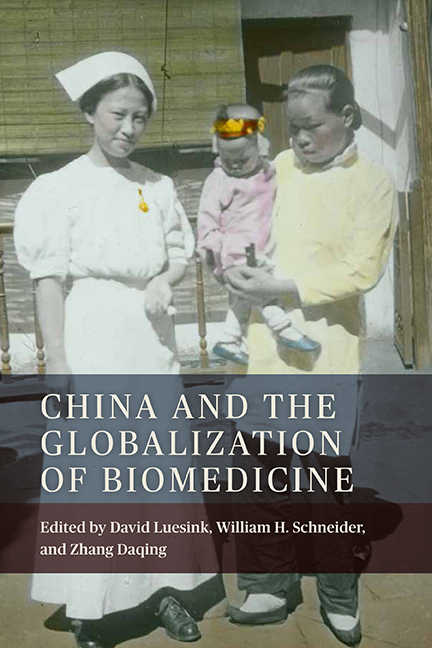Book contents
- Frontmatter
- Dedication
- Contents
- List of Illustrations
- Preface
- Acknowledgments
- List of Abbreviations
- Introduction: China and the Globalization of Biomedicine
- Part One Hygiene and Disease Construction in Late Qing China
- Part Two The Indigenization of Biomedicine in Republican China
- Part Three The Spread of Biomedicine to Southwest China, 1937–1945
- Afterword: Western Medicine and Global Health
- List of Chinese and Japanese Terms and Names
- Selected Bibliography
- List of Contributors
- Index
6 - A Social History of Wartime Nursing Training in Hunan, 1937–1945
Published online by Cambridge University Press: 27 March 2021
- Frontmatter
- Dedication
- Contents
- List of Illustrations
- Preface
- Acknowledgments
- List of Abbreviations
- Introduction: China and the Globalization of Biomedicine
- Part One Hygiene and Disease Construction in Late Qing China
- Part Two The Indigenization of Biomedicine in Republican China
- Part Three The Spread of Biomedicine to Southwest China, 1937–1945
- Afterword: Western Medicine and Global Health
- List of Chinese and Japanese Terms and Names
- Selected Bibliography
- List of Contributors
- Index
Summary
Metamorphosis, the patriotic play written by Cao Yu in 1940 after the outbreak of the Second Sino-Japanese War, depicts the wartime transformations of a decadent hospital in the context of Japanese aggression. While revealing the Chinese bureaucracy's inefficiency and corruption, Cao Yu portrays how the Chinese medical profession changed during wartime. In the play, a group of nurses work at gunpoint with a doctor to serve civilians, soldiers, and the national cause. The nursing staff, a man and two women, are dressed indistinguishably in white uniforms—“a gown of the bottom-up design, with the logo of a red cross embroidered on the left arm and a white cap on the head”—and working with “white gauze and white utensils.”
This dramatic portrait of medical workers was based on China's actual wartime realities, and it raises a series of historical questions about how gender and power relations affected the professionalization of wartime nursing. Given that white is associated with death and funerals in Chinese culture, why would nursing pioneers in China insist that these agents of healing wear white uniforms? More importantly, how did the war shape the experience of nurses? The prominence of nurses in this play is remarkable given the fact that foreign missionary nurses had only introduced the profession into China a few decades earlier. Before the rise of nursing, relatives and servants within the family held the primary responsibility of caring for the sick; a trained person to take care of the sick would strike Chinese as an alien concept. Confucian ethics stressed that respectable women should remain in the home, so a profession of attending strangers including men other than their husbands was “a breath-taking innovation.” During the 1910s, when the American nurse Nina Gage launched a pioneering nursing school in Hunan, she found it necessary to coin a Chinese term for “nurse.” Gage and her colleagues selected hushi, which might be translated as “guard scholars.” In contrast to nursing as a “women's profession” in the Anglo-American world during the early twentieth century, the enrollment of nursing students in China did not start as gender-exclusive. In fact, for Gage, boys seemed to be more promising nursing students, as “too many problems complicated the lives of the girls.”
- Type
- Chapter
- Information
- China and the Globalization of Biomedicine , pp. 159 - 182Publisher: Boydell & BrewerPrint publication year: 2019



